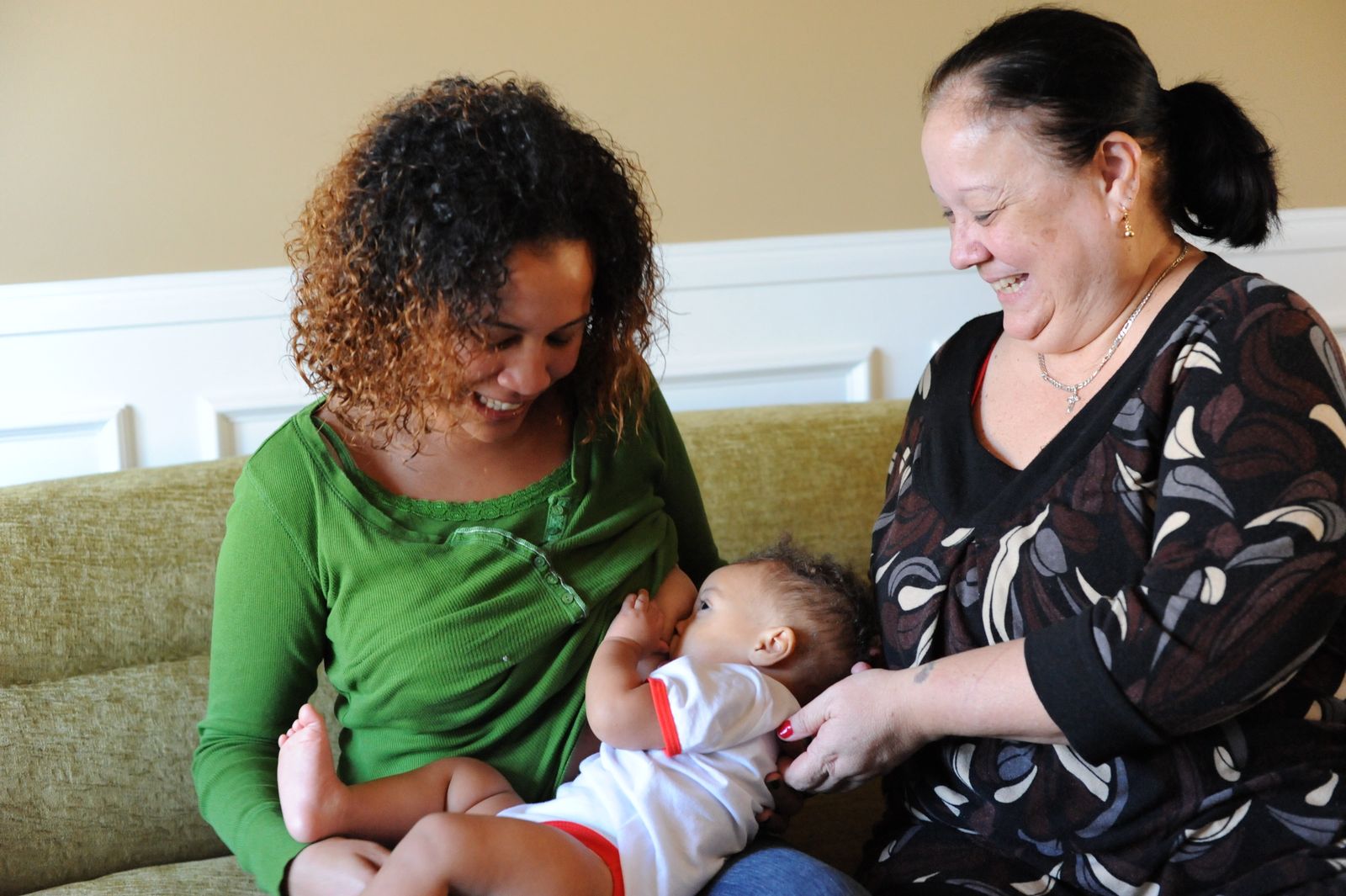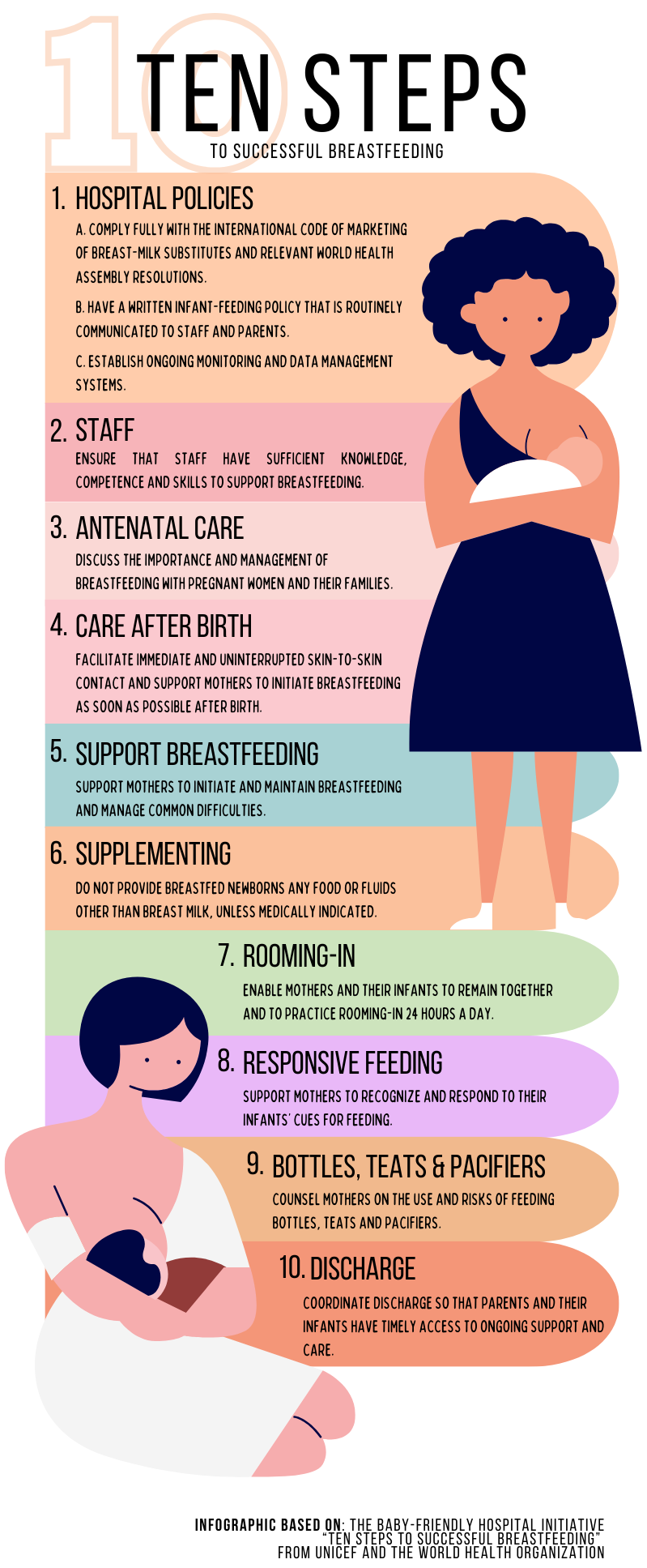
Supporting breastfeeding. The WHO has advised that national policymakers take action to offer more hospital and health care support; consider providing six months mandatory paid maternity leave; offer breastfeeding support in work and public places; initiate community-based strategies; and limit inappropriate marketing of substitute formulas. © U.S. Breastfeeding Committee
Exclusive breastfeeding for the first six months of life is proven to protect both mother and child health. According to the World Health Organization (WHO), between 2015 and 2021, 48% of mothers exclusively breastfed, meaning that their babies were not given any other food or liquids. However, this figure is based on data collected from surveys which report what a child was given in the previous 24 hours. A research team, including members from the University of Tokyo, has found that this “24-hour recall” method overestimates exclusive breastfeeding by about six times compared to a “since-birth recall” method. The 24-hour recall data also do not reflect the positive impact of in-hospital breastfeeding support and guidance. More indicators to assess child-feeding practices and mothers’ experiences are needed to increase exclusive breastfeeding and to improve breastfeeding outcomes for both.
Breastfeeding is a natural behavior but also a learned behavior that requires appropriate support. The World Health Organization and the United Nations Children’s Fund (UNICEF) recommend that babies be exclusively breastfed until the age of six months. Breast milk contains antibodies and hormones, along with nutrients, which can help build babies’ resistance to common childhood illnesses and can even reduce the risk of some diseases in adulthood. According to the Centers for Disease Control and Prevention in the U.S., breastfeeding also benefits the mother by reducing the risk of breast and ovarian cancer, type 2 diabetes and high blood pressure. However, many women breastfeed without sufficient help or guidance, which can result in mothers struggling with this demanding task and stopping earlier.

Infographic based on the WHO and UNICEF’s Ten Steps to Successful Breastfeeding. ©2023, Nicola Burghall
The WHO has set a global target to increase exclusive breastfeeding in the first six months from an estimated 38% between 2006 and 2010, to over 50% by 2025. To assess progress toward this target, the WHO and UNICEF collect data on child feeding from population-based household surveys every three to five years. These surveys ask what babies under the age of 5 months were fed, and how often, within the past 24 hours. However, this 24-hour recall method has been criticized for not giving a true picture of breastfeeding practices.
“We have found that merely asking mothers whether they are currently breastfeeding overestimates the prevalence of breastfeeding and also overlooks the importance of providing proper support in maternity facilities,” said Assistant Professor Keiko Nanishi from the Graduate School of Medicine at the University of Tokyo. “I have long thought that 24-hour recall used by the WHO as an indicator does not reflect the responsibilities of health staff and facilities. As a mother, a pediatrician, a lactation consultant and a researcher in maternal and child health, I think breastfeeding promotion should focus on creating a mother- and baby-friendly environment including health staff and facilities implementing evidence-based infant-feeding practices.”
In a study of over 4,000 mothers in Japan, Nanishi and team compared responses to questions about breastfeeding using the 24-hour recall method and the since-birth recall method. For the latter, additional questions were asked about when breastfeeding started and finished during the months since birth, when formula milk was introduced and stopped, and when complementary feeding began. Participants were also asked about in-hospital breastfeeding support, measured against the WHO’s recommended Ten Steps to Successful Breastfeeding, along with their intentions to breastfeed, social background and factors related to their experience of childbirth.
Results of the surveys showed that when using the 24-hour recall method, exclusive breastfeeding for children under 5 months was estimated to be much higher at 29.8% compared to since-birth recall, which was 4.4%. Also, exclusive breastfeeding was clearly more common when more in-hospital breastfeeding support was provided (following the WHO’s Ten Steps). However, the connection between in-hospital support and exclusive breastfeeding falsely appeared to be weaker and inconsistent when relying on data from 24-hour recall, compared to since-birth recall.
“The development, implementation and improvement of health policies require appropriate indicators to evaluate factors such as the prevalence of breastfeeding in a country or region, who needs explicit support, whether the support is effective and whether breastfeeding rates are improving,” explained Nanishi. “While the 24-hour recall method has been widely used (for example, in The State of the World’s Children report by UNICEF), we have found that using it risks misleading policymakers.”
Based on these results, Nanishi suggests that to improve breastfeeding rates, more supportive environments and policies are needed. “Medical professionals tend to unconsciously use the 24-hour recall method in their practice. They tend to ask their clients, ‘Are you currently breastfeeding your infant?’ and then try to find the cause of the failure of breastfeeding in the mother. Instead, they must ask themselves, ‘When this mother gave birth, did we provide her with appropriate care for breastfeeding?'” said Nanishi.
“I would like the general public, especially mothers, to know that successful breastfeeding is not their sole responsibility, and that proper hospital care and appropriate health policies are very important,” Nanishi explained. “Mothers tend to blame themselves when breastfeeding does not work. But instead of blaming themselves, they have the right to ask for more appropriate policies and support. I hope for a healthy and sustainable society, and I believe breastfeeding support is essential for that.”








